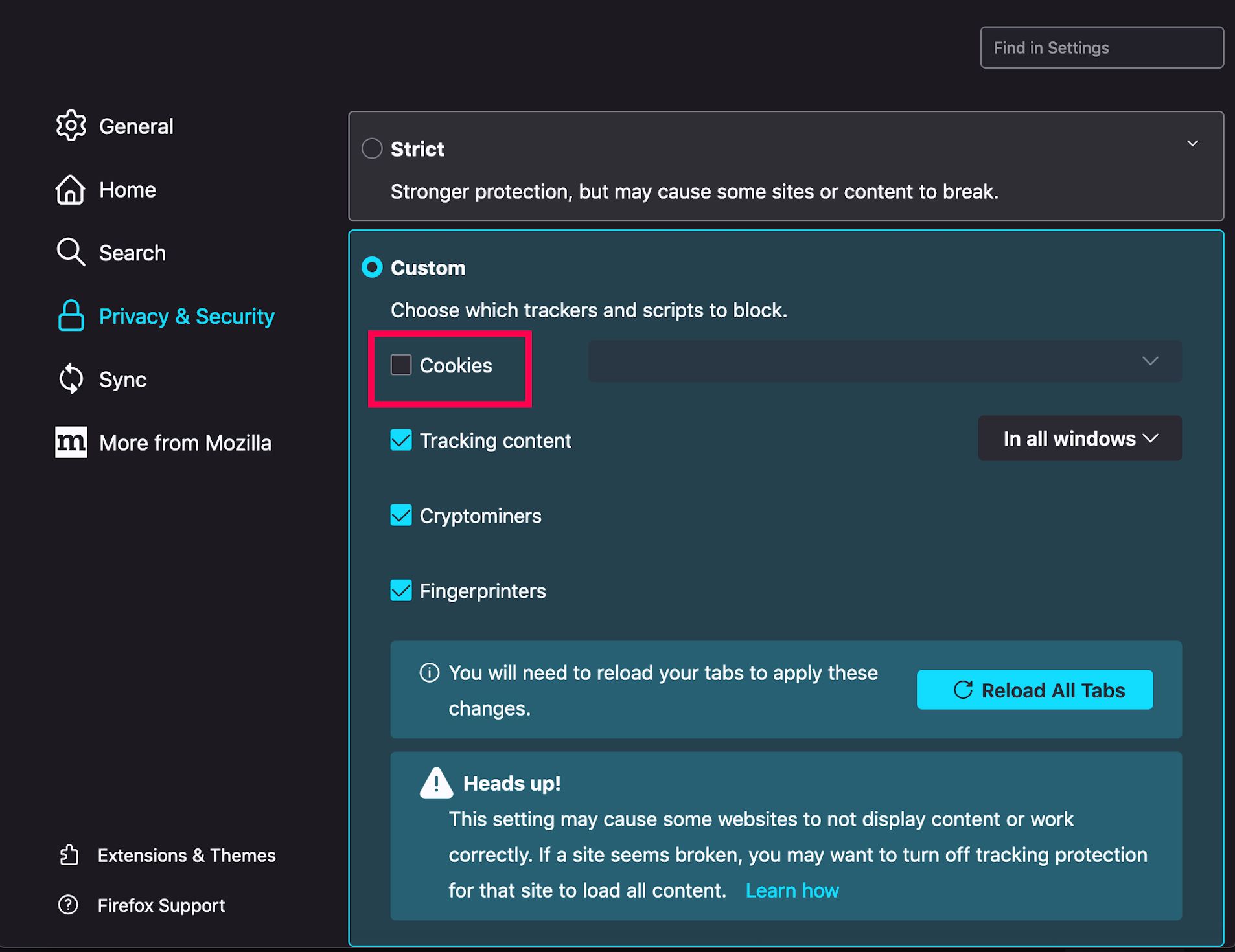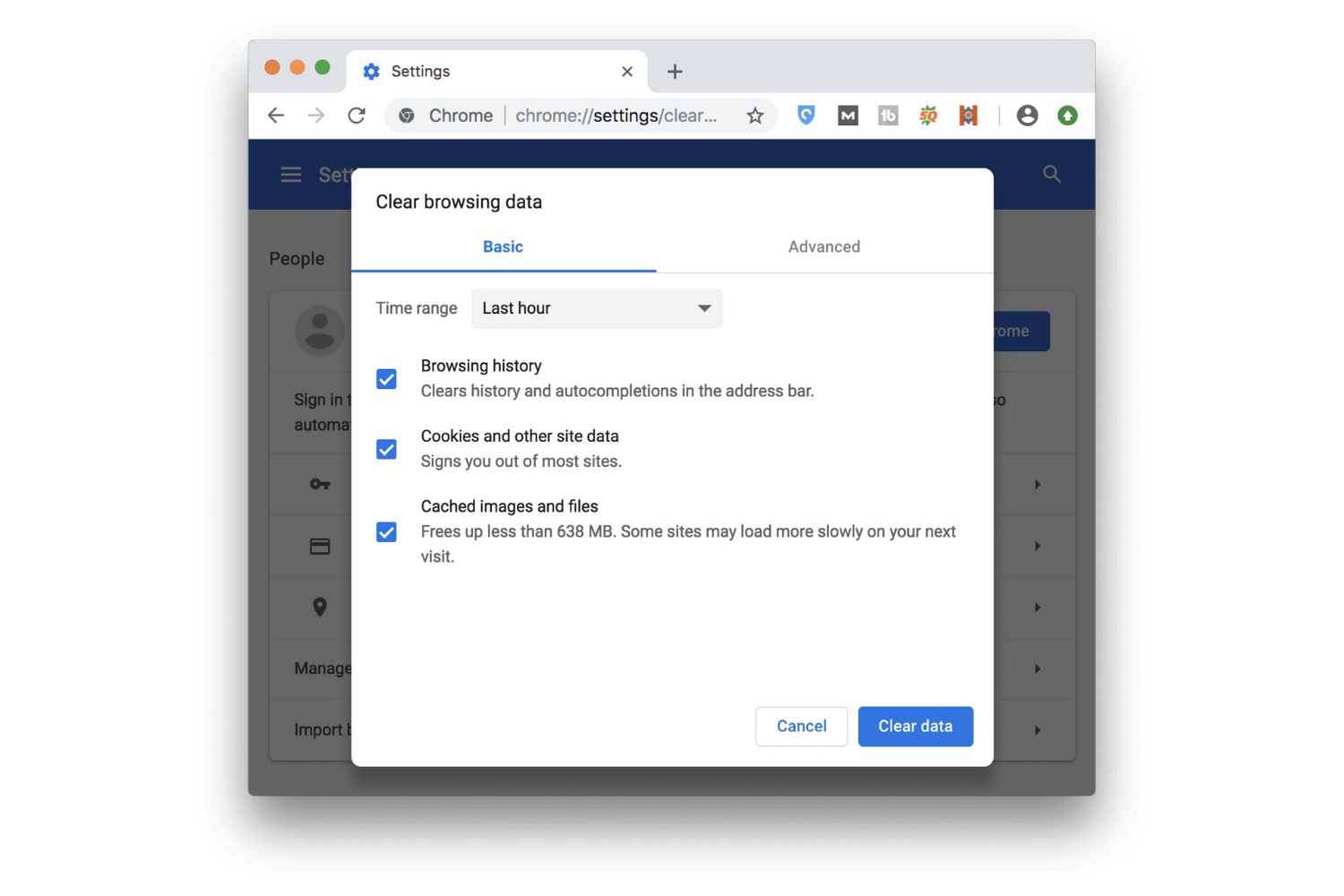Introduction
When browsing the internet, you may have come across a prompt asking you to allow cookies on a website. Perhaps you have wondered what cookies are and why websites use them. In this article, we will explore the concept of cookies and explain how to enable them in popular web browsers.
Cookies are small text files that are stored on your computer or mobile device when you visit a website. They serve various purposes, such as improving user experience, remembering login information, and personalizing website content. By allowing cookies, you enable websites to provide a more tailored and seamless browsing experience for you.
Enabling cookies in different web browsers is a straightforward process. In the following sections, we will guide you through enabling cookies in Google Chrome, Mozilla Firefox, Safari, Microsoft Edge, Internet Explorer, Opera, Android browser, and iOS (iPhone/iPad) browser. Whether you are using a desktop computer, laptop, or mobile device, we have you covered.
If you have encountered issues with cookies or need troubleshooting tips, we will address some common problems and solutions towards the end of this article. So, let’s get started and learn how to allow cookies in your preferred web browser.
What are cookies?
Cookies are small text files that websites store on your computer or mobile device when you visit them. They contain information about your browsing behavior and preferences, which can be accessed by the website the next time you visit. Cookies serve multiple purposes, such as improving website functionality, remembering user preferences, and delivering personalized content.
There are two main types of cookies:
- Session cookies: These cookies are temporary and exist only during your browsing session. They enable essential website features and are deleted as soon as you close the browser.
- Persistent cookies: Unlike session cookies, persistent cookies remain on your device even after you close the browser. They have an expiration date and are used to remember your preferences and settings for future visits.
Websites use cookies to enhance your browsing experience in several ways:
- Personalization: Cookies allow websites to remember your preferences and tailor the content to suit your interests. For example, if you frequently visit a shopping website, cookies can remember your login information, shopping cart items, and recommendations based on your previous interactions.
- Authentication: Cookies support the authentication process, enabling websites to verify your identity and remember your login credentials. This way, you don’t have to re-enter your username and password every time you visit the website.
- Tracking: Some cookies are used for tracking purposes, providing website owners with valuable insights about user behavior. This data helps them analyze website performance, target specific advertisements, and optimize their content.
It’s important to note that cookies cannot access any personal information stored on your device, such as your name, address, or contact details. They are designed to enhance your browsing experience and provide a more personalized and convenient online journey.
Now that you have a better understanding of what cookies are and their purposes, let’s proceed to the next section and learn how to enable cookies in popular web browsers.
Why do websites use cookies?
Websites use cookies for various reasons to enhance the user experience, improve functionality, and gather valuable data for analysis and customization. Here are some key reasons why websites rely on cookies:
- Personalization: Cookies enable websites to remember your preferences and provide you with a more personalized experience. For example, a news website might use cookies to remember your preferred language, region, or display settings. This ensures that each time you visit the site, it is customized to your preferences, making your browsing experience more enjoyable and efficient.
- User Authentication: Cookies play a crucial role in user authentication. When you log into a website, a cookie is created to remember your login information. This allows you to navigate different pages of the site without having to re-enter your credentials. Without cookies, you would need to log in again every time you visit a new page on the site.
- Shopping Cart: E-commerce websites use cookies to store information about items you add to your shopping cart. This allows you to continue shopping without losing the items you have already selected. Cookies ensure that your cart items are retained even if you navigate away from the site or close your browser temporarily.
- Analytics and Performance: Cookies help website owners analyze user behavior and track website performance. By collecting data, such as the number of visitors, pages visited, and the duration of each visit, cookies provide insights that help optimize website design, layout, and content. This data helps website owners understand user preferences and tailor the site accordingly.
- Advertisements: Many websites rely on advertising revenue to support their operations. Cookies play a crucial role in delivering targeted ads to users. By analyzing your browsing behavior and interests, cookies enable websites to display relevant advertisements. This benefits both users, who see ads of potential interest, and advertisers, who can reach their target audience more effectively.
While cookies offer several benefits, it is essential to be aware of your privacy and security online. Some users may have concerns about the collection and sharing of their data. Most modern web browsers provide options to manage cookie settings and have mechanisms in place to protect users’ privacy.
Now that you understand why websites use cookies let’s proceed to the next section where we will learn how to enable cookies in popular web browsers.
How do cookies work?
Understanding how cookies work is essential to grasp their role in enhancing your browsing experience. When you visit a website, the site sends a small text file, known as a cookie, to your web browser. The browser stores this cookie on your computer or mobile device. The next time you visit the same website, your browser sends the stored cookie back to the server, allowing the website to recognize and remember your preferences.
Each cookie contains information such as a unique identifier, expiration date, and specific data related to your interaction with the website. This data can include your login information, language preference, browsing activity, and more.
Cookies serve multiple functions:
- Session Management: During a browsing session, websites use session cookies to keep track of user actions. For example, when you add items to your shopping cart or fill out a form, session cookies help the website remember these actions until you leave the site or close the browser. Once the session ends, these session cookies are deleted.
- Personalization: Cookies enable websites to remember your preferences and personalize your experience. For example, if you change the font size or color scheme of a website, cookies store this information and apply it each time you visit. This saves you from having to manually modify the settings each time.
- Tracking and Analytics: Websites use cookies to gather data about user behavior and analyze website performance. Website owners can track metrics like the number of visitors, pages visited, and the time spent on each page. This information helps them understand how users interact with their site and make improvements accordingly.
- Authentication and Security: Cookies provide secure authentication by storing your login information. When you log into a website, a cookie is created with a unique identifier that confirms your identity. This allows you to navigate different pages of the site without needing to log in again.
- Third-party Cookies: Some websites integrate third-party services, such as social media plugins or advertising networks. These third-party cookies enable these services to track your browsing activity across multiple websites, providing personalized content and targeted advertisements.
It is important to note that cookies are limited to the domain that created them. They cannot access data from any other domain. Additionally, cookies are designed to be read only by the website that created them, ensuring the security and privacy of your information.
Overall, cookies play a vital role in enhancing your browsing experience by personalizing content, improving functionality, and providing valuable insights to website owners. Now that you have a better understanding of how cookies work, let’s move on to the next section where we will learn how to enable cookies in popular web browsers.
How to enable cookies in Google Chrome
Enabling cookies in Google Chrome is a simple process. Follow the steps below to allow cookies in this popular web browser:
- Launch Google Chrome on your computer.
- Click on the three-dot menu icon located in the top-right corner of the browser window.
- From the menu, select “Settings”.
- Scroll down and click on “Advanced” to expand the advanced settings.
- Under the “Privacy and security” section, click on “Site settings”.
- Next, click on “Cookies and site data”.
- To enable cookies, make sure that the “Allow sites to save and read cookie data” option is enabled.
- If you want to manage individual cookie settings, click on “See all cookies and site data”. From there, you can view and control cookie permissions for specific websites.
- Once you have made the desired changes, close the settings tab. Google Chrome will remember your cookie preferences.
Enabling cookies in Google Chrome allows websites to store and retrieve data, enhancing your browsing experience. Keep in mind that cookies from different websites are stored separately, ensuring privacy and security.
That’s it! You have successfully enabled cookies in Google Chrome. Now websites will be able to save and access cookie data to provide you with personalized content and better functionality.
How to enable cookies in Mozilla Firefox
To enable cookies in Mozilla Firefox, follow the steps below:
- Open Mozilla Firefox on your computer.
- Click on the three-line menu icon in the top-right corner of the browser window.
- From the drop-down menu, select “Preferences” (or “Options” on Windows).
- In the left-hand sidebar, click on “Privacy & Security”.
- Under the “Cookies and Site Data” section, make sure the checkbox next to “Accept cookies and site data from websites” is checked.
- If you want to manage cookie settings for individual websites, click on “Manage Exceptions”. From there, you can allow or block cookies from specific sites.
- Close the preferences tab to save your changes.
Enabling cookies in Mozilla Firefox allows websites to store and retrieve data, enhancing your browsing experience. Each website’s cookies are stored separately, ensuring your privacy and security.
That’s it! You have successfully enabled cookies in Mozilla Firefox. Now websites will be able to save and access cookie data to provide you with personalized content and better functionality.
How to enable cookies in Safari
To enable cookies in Safari, follow the steps below:
- Open Safari on your computer.
- Click on “Safari” in the top menu bar.
- From the drop-down menu, select “Preferences”.
- In the Preferences window, click on the “Privacy” tab.
- Under the “Cookies and website data” section, select one of the following options:
- Always block: This option prevents all websites from storing cookies on your device.
- Allow from current websites only: This setting only allows cookies from the website you are currently accessing, blocking all others.
- Allow from websites I visit: Selecting this option enables cookies for the websites you visit regularly.
- Always allow: This option allows all websites to store cookies on your device.
- Once you have made your selection, close the Preferences window. Safari will remember your cookie preferences.
Enabling cookies in Safari allows websites to store and retrieve data, enhancing your browsing experience. Each website’s cookies are stored separately, ensuring your privacy and security.
That’s it! You have successfully enabled cookies in Safari. Now websites will be able to save and access cookie data to provide you with personalized content and better functionality.
How to enable cookies in Microsoft Edge
To enable cookies in Microsoft Edge, follow the steps below:
- Open Microsoft Edge on your computer.
- Click on the three-dot menu icon in the top-right corner of the browser window.
- From the drop-down menu, select “Settings”.
- In the left-hand sidebar, click on “Privacy, search, and services”.
- Under the “Cookies and site permissions” section, click on “Cookies and other site data”.
- Select the option “Allow all cookies” to enable cookies for all websites.
- If you want to manage cookie settings for individual websites, click on “Manage” under the “Sites that can never use cookies” section. From there, you can add or remove websites and choose whether to allow or block cookies for each site.
- Close the settings tab to save your changes.
Enabling cookies in Microsoft Edge allows websites to store and retrieve data, enhancing your browsing experience. Each website’s cookies are stored separately, ensuring your privacy and security.
That’s it! You have successfully enabled cookies in Microsoft Edge. Now websites will be able to save and access cookie data to provide you with personalized content and better functionality.
How to enable cookies in Internet Explorer
To enable cookies in Internet Explorer, follow the steps below:
- Open Internet Explorer on your computer.
- Click on the gear icon in the top-right corner of the browser window to open the settings menu.
- From the drop-down menu, select “Internet options”.
- In the Internet Options window, select the “Privacy” tab.
- Under the “Settings” section, move the slider to an appropriate setting:
- Block all cookies: This setting prevents all websites from storing cookies on your device.
- High: This setting blocks third-party cookies and allows only first-party cookies from websites you visit.
- Medium-high: This setting blocks third-party cookies and allows session cookies.
- Medium: This setting allows most cookies while blocking third-party cookies.
- Low: This setting allows all cookies, including third-party cookies.
- If you want to manage cookie settings for individual websites, click on the “Sites” button. From there, you can add specific websites to allow or block cookies.
- Click “OK” to save your changes and close the Internet Options window.
Enabling cookies in Internet Explorer allows websites to store and retrieve data, enhancing your browsing experience. Each website’s cookies are stored separately, ensuring your privacy and security.
That’s it! You have successfully enabled cookies in Internet Explorer. Now websites will be able to save and access cookie data to provide you with personalized content and better functionality.
How to enable cookies in Opera
To enable cookies in Opera, follow the steps below:
- Open Opera on your computer.
- Click on the Opera menu icon in the top-left corner of the browser window.
- From the drop-down menu, select “Settings”.
- In the Settings tab, click on “Advanced” in the left-hand sidebar.
- Under the “Privacy & security” section, click on “Site settings”.
- Scroll down to the “Cookies and site data” section.
- Select the option “Allow sites to save and read cookie data” to enable cookies for all websites.
- If you want to manage cookie settings for individual websites, click on “Manage exceptions”. From there, you can add specific websites and choose whether to allow or block cookies for each site.
- Click on the “Done” button to save your changes and close the settings tab.
Enabling cookies in Opera allows websites to store and retrieve data, enhancing your browsing experience. Each website’s cookies are stored separately, ensuring your privacy and security.
That’s it! You have successfully enabled cookies in Opera. Now websites will be able to save and access cookie data to provide you with personalized content and better functionality.
How to enable cookies in Brave
To enable cookies in Brave, follow the steps below:
- Open Brave on your computer.
- Click on the menu icon in the top-right corner of the browser window.
- From the drop-down menu, select “Settings”.
- In the Brave settings tab, click on “Shields” in the left-hand sidebar.
- Under the “Cookie Control” section, ensure that “Allow all cookies” is selected.
- If you want to manage cookie settings for individual websites, you can click on the “Cookie Control Exceptions” button. From there, you can add specific websites and choose whether to allow or block cookies for each site.
- Close the settings tab to save your changes.
Enabling cookies in Brave allows websites to store and retrieve data, enhancing your browsing experience. Each website’s cookies are stored separately, ensuring your privacy and security.
That’s it! You have successfully enabled cookies in Brave. Now websites will be able to save and access cookie data to provide you with personalized content and better functionality.
How to enable cookies in Android browser
The process for enabling cookies in the Android browser may vary slightly depending on the specific browser app you are using. However, the general steps below should guide you in enabling cookies:
- Open the browser app on your Android device.
- Tap on the menu icon, typically represented by three horizontal dots or lines, located in the top-right corner of the browser window.
- From the dropdown menu, select “Settings” or “Preferences”.
- Navigate to the “Privacy” or “Site Settings” section.
- Look for an option related to “Cookies” or “Accept Cookies”.
- Ensure that the toggle switch or checkbox is turned on to allow cookies.
- Some browser apps may offer more specific cookie settings, such as blocking third-party cookies or allowing cookies only from the websites you visit. Adjust these settings according to your preferences.
- Save your changes and exit the settings menu.
Enabling cookies in the Android browser allows websites to store and retrieve data, enhancing your browsing experience. Each website’s cookies are stored separately, ensuring your privacy and security.
Note that the exact steps may vary based on the browser app you are using on your Android device. These steps should provide a general guideline to enable cookies in most Android browser apps.
That’s it! You have successfully enabled cookies in your Android browser. Now websites will be able to save and access cookie data to provide you with personalized content and better functionality.
How to enable cookies in iOS (iPhone/iPad) browser
Enabling cookies in the iOS browser on your iPhone or iPad is a simple process. Follow the steps below to allow cookies:
- Open the “Settings” app on your iPhone or iPad.
- Scroll down and tap on “Safari” or the browser app you are using.
- In the Safari settings, scroll down to the “Privacy & Security” section.
- Ensure that the “Block All Cookies” option is turned off. This allows websites to store and retrieve data through cookies.
- Alternatively, you can select the “Allow from Websites I Visit” option to only enable cookies for websites you visit.
- Exit the settings app. Your changes will be saved automatically.
Enabling cookies in the iOS browser allows websites to store and retrieve data, enhancing your browsing experience. Each website’s cookies are stored separately, ensuring your privacy and security.
That’s it! You have successfully enabled cookies in the iOS browser on your iPhone or iPad. Websites will now be able to save and access cookie data to provide you with personalized content and better functionality.
Common issues and troubleshooting tips
While enabling cookies can greatly improve your browsing experience, you may encounter some common issues along the way. Here are a few troubleshooting tips to help resolve these issues:
- Cookies not enabled: If you have followed the steps to enable cookies but they still don’t seem to work, double-check your browser settings. Ensure that cookies are allowed and not blocked by any browser extensions or security software.
- Cookies getting blocked: Sometimes, certain security settings or browser extensions can block cookies from specific websites. Try disabling any security or privacy software temporarily to see if it resolves the issue. If the problem persists, check any browser extensions or plugins that may be interfering with cookie functionality.
- Clearing cache and cookies: If you are still experiencing issues, clearing your browser’s cache and cookies may help. This removes any stored data that may be causing conflicts or errors. Refer to your browser’s settings or preferences to find the option to clear cache and cookies.
- Updating your browser: Running an outdated version of your browser can sometimes lead to cookie-related issues. Make sure you are using the latest version of your browser and update it if necessary. Newer versions often include bug fixes and improved cookie management.
- Third-party cookie restrictions: Some browsers have settings to restrict or block third-party cookies by default. This can impact the functionality of certain websites. Consider adjusting your browser’s settings to allow third-party cookies if needed.
- Check your device’s date and time: Incorrect date and time settings on your device can cause problems with cookies and website functionality. Make sure your device’s date and time settings are accurate.
If you have tried these troubleshooting tips and are still experiencing issues with cookies, consider reaching out to the website’s support team or consulting the browser’s official support documentation for further assistance.
Remember, cookies play a crucial role in enhancing your browsing experience, so it’s important to resolve any cookie-related issues to ensure a seamless and personalized online journey.
Conclusion
Enabling cookies in your web browser allows websites to remember your preferences, personalize content, and enhance your browsing experience. Through the storage and retrieval of small text files, cookies play a crucial role in providing convenience and customization.
In this article, we have explored the concept of cookies and why websites use them. We have discussed how cookies work and the benefits they offer, such as personalization, authentication, tracking, and improving website performance.
Additionally, we have provided step-by-step instructions on how to enable cookies in popular web browsers such as Google Chrome, Mozilla Firefox, Safari, Microsoft Edge, Internet Explorer, Opera, Brave, Android browser, and iOS browser. By following these guidelines, you can ensure that cookies are enabled and optimize your browsing experience across different devices.
We have also addressed common issues related to cookies and provided troubleshooting tips to help you resolve any challenges you may encounter.
Remember to take your privacy and security into account when enabling cookies. While cookies are generally harmless and designed to enhance your experience, it’s important to be cautious and use trusted websites.
By enabling cookies, you allow websites to provide you with personalized content, seamless navigation, and improved functionality. Embrace the benefits that cookies offer, and enjoy a more tailored and enjoyable browsing experience.

























